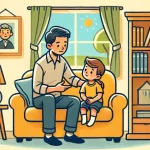How to handle peer pressure as a teenager? Mimicking actions occur with several teens. Friends or other people your age might tempt you to do something, such as acting a particular way or making specific decisions.
That’s not to say peer pressure is always wrong. There are benefits, like trying a new activity or hobby.
How to Handle Peer Pressure as a Teenager
What Is a Note on Peer Pressure? It can be something as significant as testing a new sport or one which could be better, for example, missing classes for no logical reason. These tips might help you face the issue of peer pressure:-
1. Understand Peer Pressure
This is what we know as peer pressure, where you are forced to do something simply because others like it.
- Indirect: When you are told to do something
- Indirect: When you think/feel like something needs to be done to fit in.
Identifying what it looks like can help you know when peers are pressuring you.
2. Know What’s Important to You
Values are things you believe in, such as honesty or kindness. Your values can guide your decisions to help you choose what is best for yourself.
- What Matters to You: Your Values
- Draw Boundaries: Typically, they know what is and is not acceptable to them.
3. Build Confidence
This should remind you of your confidence, which is your belief in yourself. It enables you to say no when necessary.
- Positive Self Talk: Be aware of your strengths.
- Hang With The People Who Make You Happy: Focus on doing things that you love (things) to make you feel good about yourself.
4. Learn to Say No
You must, and it is O.K to say no to things that make you uncomfortable.
- No Means No: If you refuse to do something, say it in a gentle way … “Thank You!
- Use “I” Statements: I do not want to do this.
5. Choose Good Friends
No friend forces you to make a decision that goes contrary to what your gut says.
- Seek Supportive Friends: Select friends who are understanding of you.
- Steer clear of bad influences: people who lure you into doing things that are not ideal for your overall health and others’ health.
6. Practice What to Say
Practice saying no or discussing peer pressure with a friend or family member.
Act it out: Playing scenarios back in your head and practicing answers.
7. Talk to an Adult
Talk to an adult you trust, like a parent or teacher, about peer pressure.
Seek assistance: Feel free to ask for help. They can advise and provide support.
8. Focus on Your Goals
Objectives allow you to make your decisions well.
Ponder your future: Recall what you are working for.
9. Be Honest About Your Feelings
If you feel that way, talk to your friends. A good friend will take the time to listen and, therefore, understand your troubles.
Confide The Problem To Someone: Share your feelings with your friends
10. Be Yourself
It’s okay to be different. You don’t have to play by everyone else’s rules.
Embrace Your Differences: Different is good.
What, exactly, is teen peer pressure?
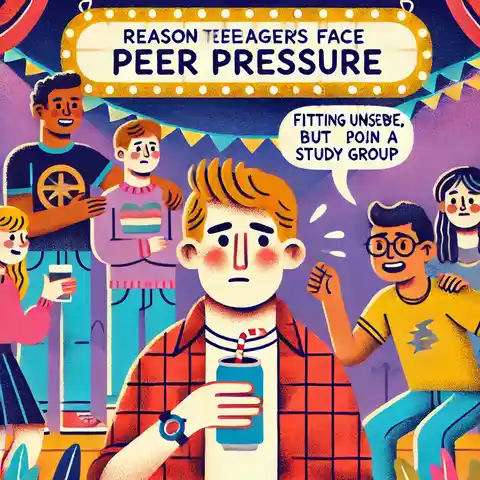
Many teenagers face peer pressure. The following are some of the core ones:
- Peer Pressure: In our teenage years, the wish to belong and be accepted by friends can seem immense. Typically, teens want to be famous and can feel that they should conform because it allows them to fit in with other people.
- Wonder: Teenagers are naturally curious and looking to explore who they are as individuals in the world around them. They may even feel pressured to experience something new because they are curious about what their friends are up to.
- Fear of rejection: Many teens may fear that they will be outcasts in their group and may be rejected if, for some reason, they cannot join. They might be concerned that if they do not back up the group, their friends will no longer like them or maybe even bully and pester them.
- Peer Pressure: Teens may feel the need to do things to impress their friends or appear “cool.” Some may engage in unsafe activities or wear particular attire to get the green light from their friends.
- Impact of Social Media: Often, social media becomes another significant factor in peer pressure. This can lead them to feel that online, as they are watching what others do,… feeling like if all these other people do it—they must partake in order to be with the crowd or be famous.
- No Self-Esteem: If a teenager does hold the same feeling of himself or little confidence thereof, then he may easily bow down towards peer pressure. They might believe that going with the crowd is an answer to feeling good about oneself or getting recognized.
Knowing the reasons will help teens identify peer pressure quickly and avoid falling victim to it by simply following along.
What should I do if I give in to peer pressure?
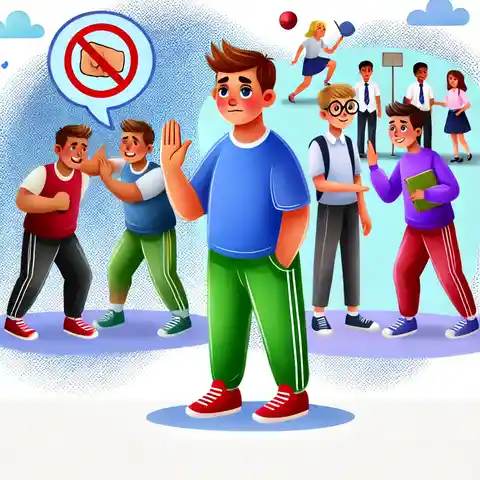
In this case, you will only have to do the following :
- Remember That Life Goes On: It may be scary to imagine that you gave into peer pressure and slid really backward, but everyone has a home at some point in their lives when they feel let down. Just remember that no one is perfect, so be kind to yourself. But at the end of the day, mistakes are a large part of learning and making things better for next time.
- Think About It: Mull over what happened. I wonder why you felt forced and struggled to say no. Analyzing what happened will help you prepare for future such incidents.
- Experience to Knowledge: If peer pressure gets the best of you, reflect on what you can learn about yourself. Perhaps you realized that you must work on the ability to say no or have a friend who was less of a positive influence than they were worth. This experience will help you choose better next time.
- Talk to Someone You Trust: Speaking out loud about what happened can be helpful, so try talking with a trusted adult, teacher or friend. They will help you through tricky times and advise you on how to better your situation.
- Formulate a Game Plan: Consider how you might handle a similar situation or one like it in the future. Refuse or develop other strategies to resist peer pressure. The more you prepare, the better your confidence will grow.
- Stay Clear of Bad Influence: Clean from negative people that led you to succumb to peer pressure. Only people who respect your decisions and support you to be yourself; surrounding by them is all that matters.
- Remember Your Values: Focus on what is truly important to you and the reasons behind that. Staying true to your values will enable you to make the right decisions for yourself, no matter what others tell you.
By doing this, you can turn a mistake into something positive, and you will also learn and be better prepared for peer pressure next time.
Why selecting the right friends is important
Here’s why:
Good friends will respect your choices, even if they disagree.
- Respect Your Choices: If you have friends who care about you, they will encourage you…
- Providing Assistance: Life will try to help your friends correctly and make them stronger.
- Negative Pressure Eased: When you choose friends who do not push the boundaries of your core values, it is easier for you to remain faithful to form.
In this case, I was lucky enough to have friends who respected me enough to give me the space and support I needed.
How to tackle peer pressure in a positive way
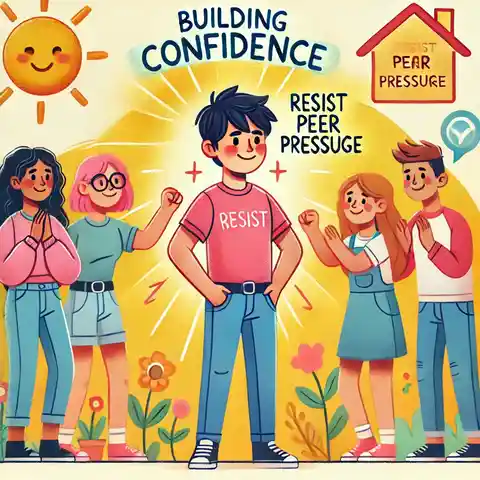
Here are some tips:
- Tackle a Favorite Hobby: This investment will keep you preoccupied, such as a different sport or music and art. Doing so would help keep you focused on what you enjoy, and this would help bond relationships with friends who like similar things.
- Ask for Help: When uncertain about a situation, speak with the trusted adult in your life (parent/teacher).
- Share Your Feelings: If you can not do something, let your friends know how you feel. True friends will respect your feelings.
- Prepare Your Responses: Anticipate Pressure Adapt your responses, and it will become easier to say no when the time does come.
Leave the Second You Get Uncomfortable The priority is to look after yourself rather than just trying to fit in with everyone else.
Some constructive strategies to deal with the peer pressure in a healthy way;
When do I need help with peer influences?
Another example is if you are feeling too anxious or if you do not know how to deal with peer pressure. Here’s when to reach out:
- Feeling Scared or Anxious: If peer pressure makes you scared or anxious, you should talk to someone.
- Unable to Say No: If you struggle to say no, especially when it is necessary, talking with a responsible adult might benefit you.
- Disrespectful friends: If your friends keep urging you to do things that are not within what you actually want, then it becomes mandatory for a person to state and understand how he can prevent himself from being daunted.
- Emotional Emptiness: If you ever feel like the world is moving on and nobody gets what you are going through, needing somebody to talk to might support you from a professional counselor, parent or teacher.
Having someone to guide you is a good way of protecting yourself and making the right decisions.
What does Peer Pressure look like?
Peer Pressure Joints & Blunt sundry You are under peer pressure if like:
- Feel Uncomfortable: unsure of what the other wants you to do.
- Fear of Missing Out: You fear that your social group will do without you if you sit out.
- Act Against Your Principles: you feel pressured to do what are, frankly, intrusive things for you.
If you think something like this, it may be peer pressure.
What are some examples of peer pressure?
Here are a few examples:
Positive Peer Pressure
Join a club or do something meta demanded of by your friends;
Your team is behind you studying for a test.
Negative Peer Pressure
We hang out with our friends, so when we think of skipping school or breaking some rules at my house, they push me to do it.
You may be pressured into smoking or drinking because the rest of your friends are.
You need to recognize these examples to be more apt to submit when it comes to peer pressure.
How to Deal with Peer Pressure in Order Not to Say Yes
Here are some ways to say no:
- And be upfront about it — just say your NO!
- Prepare: Before You Speak, have a plan and make your points
- Propose An Alternative: Give a new suggestion, for example, “How about we play basketball instead of doing that?”
- Inject Humor — Crack a Joke: Just take the pressure off by saying, “I am not looking for such hassles!”
So stand up when you need to, and just say NO.
How Can I Develop The Rights And Say No When Peer Pressuring?
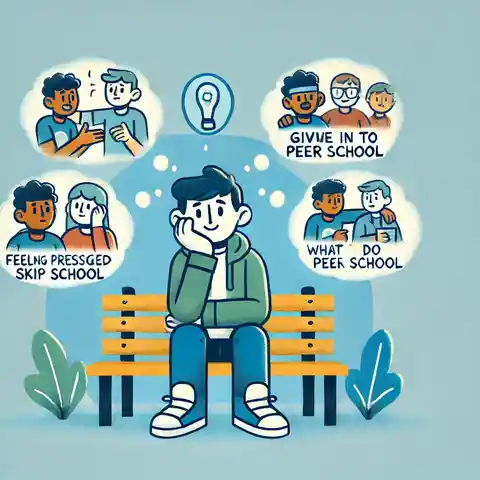
This is how you develop confidence:
- Culture Know Your Values
- Practice positive self-talk: Tell yourself that you have many charms.
- Be around friends who will appreciate your choices
- Change up the same old; try doing things you like to boost your weekend confidence.
Being confident is about knowing who you are and what you stand for.
Handling peer pressure as a teenager is problematic in itself. Know your values, build confidence, and say no to pressure so that you can push back and make choices that are indeed yours.
It’s your right to be yourself and rise up for what you believe in. Surround yourself with friends who support you, seek help, and work towards your goals. You have made your Choices and can channel a positive direction for the rest of your life.


